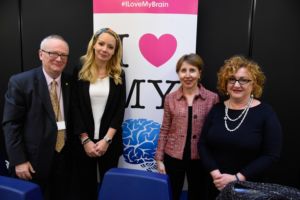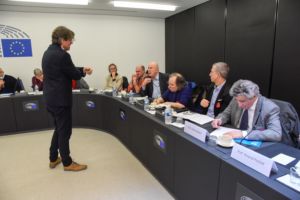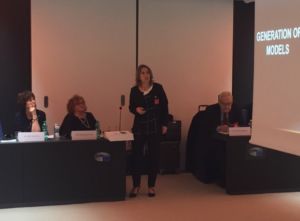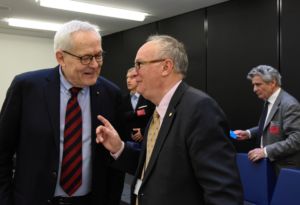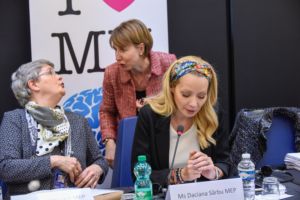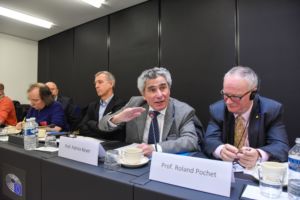On 15 March 2018, EBC held its annual Brain Awareness Week event at the European Parliament (in Strasbourg, France) in partnership with FENS, EDAB, BBC, University of Strasbourg-Neuropole and the Bureau Grand Est. The event is designed for outreach to the general public and policymakers, to give an insight into the world of neuroscience and communicate just how important the work of neuroscientists is for society. This year’s event was co-hosted by MEPs Anne Sander (France, EPP), Daciana Sârbu (Romania, S&D), and Lieve Wierinck (Belgium, ALDE), who all gave powerful talks about the need for continued support of neuroscience and research, as well as the need for scientists to be empowered to communicate their work to the general public and how their research has an impact on lives. The event was officially opened by co-moderators EBC President Prof. Monica Di Luca and EBC Treasurer Ms Joke Jaarsma.
The first speaker was Prof. Albert Gjedde of the University of Copenhagen. His talk covered “The predictive brain and the future: to boldly go where no one has gone before” which explored how the most fundamental questions about the brain still remain unanswered despite the great advances in neuroscience over the recent years. More than ever before, neuroscientists must engage in efforts to test and apply this novel insight into the key functions of the human brain, as part of neuroscience’s continuing mission to explore the challenges that humans face when their brains age.
The second speaker was Prof. Steven Laureys, Director of the Coma Science Group at the GIGA Research and Neurology Department of the University and University Hospital of Liège, Belgium. He spoke freely to the room on his work in consciousness and coma science, and how understanding consciousness remains one of the greatest mysteries for science to solve. He also made the case for continued but starker support from the EU institutions for science and research, asking for continuity in funding and the work being done- breaking free from project-based restraints, allowing for consistency and longer-term research.
The final speaker was Prof. Gaia Novarino, neuroscientist who investigates the genetic and molecular basis of neurodevelopmental disorders at IST Austria, and spoke on how scientists work to find treatments for pediatric neurological disorders. Neurodevelopmental disorders affect millions of individuals from very young ages, and are often refractory to treatments, and despite decades of intensive research disorders such as autism and epilepsy remain poorly treatable. However, in the last years, researchers have found that autism spectrum disorders, epilepsy and mental retardation are often caused by tiny mistakes in the patient’s DNA; genetic information, therefore, may retain the key to reveal potential
treatment options.
A discussion with the audience follow the speakers, and was a great display of interest and curiosity from the full room. Attending neuroscientists and MEPs alike posed questions to our three speakers, the panel and discussants Prof. Roland Pochet and EBC Vice-President Prof. Patrice Boyer.
EBC would like to thank all its partners and collaborators for making this Brain Awareness Week 2018 outreach event an excellent success, as well as all the attendees who took the time out of their day to travel to the Parliament to make the event. We also extend a special thank you to all MEPs that attended the event and took part in the lively discussion.
The full programme with speakers biographies and abstracts can be found here
The event was livestreamed here





